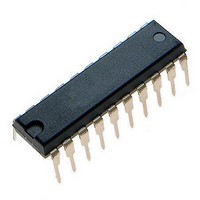MCR908JK1ECPE Freescale Semiconductor, MCR908JK1ECPE Datasheet - Page 55

MCR908JK1ECPE
Manufacturer Part Number
MCR908JK1ECPE
Description
IC MCU 1.5K FLASH 8MHZ 20-DIP
Manufacturer
Freescale Semiconductor
Series
HC08r
Datasheet
1.MC908JK1ECDWE.pdf
(180 pages)
Specifications of MCR908JK1ECPE
Core Processor
HC08
Core Size
8-Bit
Speed
8MHz
Peripherals
LED, LVD, POR, PWM
Number Of I /o
14
Program Memory Size
1.5KB (1.5K x 8)
Program Memory Type
FLASH
Ram Size
128 x 8
Voltage - Supply (vcc/vdd)
2.7 V ~ 3.3 V
Data Converters
A/D 12x8b
Oscillator Type
External
Operating Temperature
-40°C ~ 85°C
Package / Case
20-DIP (0.300", 7.62mm)
Processor Series
HC08JK
Core
HC08
Data Bus Width
8 bit
Data Ram Size
128 B
Maximum Clock Frequency
8 MHz
Number Of Programmable I/os
15
Number Of Timers
2
Maximum Operating Temperature
+ 85 C
Mounting Style
Through Hole
Development Tools By Supplier
FSICEBASE, DEMO908JL16E, M68CBL05CE
Minimum Operating Temperature
- 40 C
On-chip Adc
8 bit, 12 Channel
Lead Free Status / RoHS Status
Lead free / RoHS Compliant
Eeprom Size
-
Connectivity
-
Lead Free Status / Rohs Status
Details
Available stocks
Company
Part Number
Manufacturer
Quantity
Price
Company:
Part Number:
MCR908JK1ECPE
Manufacturer:
Freescale Semiconductor
Quantity:
135
5.3.2.5 LVI Reset
The low-voltage inhibit module (LVI) asserts its output to the SIM when the V
trip voltage V
(RSTB) is held low while the SIM counter counts out 4096 2OSCOUT cycles. Sixty-four 2OSCOUT cycles
later, the CPU and memories are released from reset to allow the reset vector sequence to occur. The
SIM actively pulls down the (RSTB) pin for all internal reset sources.
5.4 SIM Counter
The SIM counter is used by the power-on reset module (POR) and in stop mode recovery to allow the
oscillator time to stabilize before enabling the internal bus (IBUS) clocks. The SIM counter also serves as
a prescaler for the computer operating properly module (COP). The SIM counter uses 12 stages for
counting, followed by a 13th stage that triggers a reset of SIM counters and supplies the clock for the COP
module. The SIM counter is clocked by the falling edge of 2OSCOUT.
5.4.1 SIM Counter During Power-On Reset
The power-on reset module (POR) detects power applied to the MCU. At power-on, the POR circuit
asserts the signal PORRST. Once the SIM is initialized, it enables the oscillator to drive the bus clock
state machine.
5.4.2 SIM Counter During Stop Mode Recovery
The SIM counter also is used for stop mode recovery. The STOP instruction clears the SIM counter. After
an interrupt, break, or reset, the SIM senses the state of the short stop recovery bit, SSREC, in the mask
option register. If the SSREC bit is a one, then the stop recovery is reduced from the normal delay of 4096
2OSCOUT cycles down to 32 2OSCOUT cycles. This is ideal for applications using canned oscillators
that do not require long start-up times from stop mode. External crystal applications should use the full
stop recovery time, that is, with SSREC cleared in the configuration register (CONFIG).
5.4.3 SIM Counter and Reset States
External reset has no effect on the SIM counter. (See
free-running after all reset states. (See
internal reset recovery sequences.)
5.5 Exception Control
Normal, sequential program execution can be changed in three different ways:
5.5.1 Interrupts
An interrupt temporarily changes the sequence of program execution to respond to a particular event.
Figure 5-8
Freescale Semiconductor
•
•
•
Interrupts
–
–
Reset
Break interrupts
Maskable hardware CPU interrupts
Non-maskable software interrupt instruction (SWI)
flow charts the handling of system interrupts.
TRIP
. The LVI bit in the SIM reset status register (SRSR) is set, and the external reset pin
MC68HC908JL3E Family Data Sheet, Rev. 4
5.3.2 Active Resets from Internal Sources
5.6.2 Stop Mode
for details.) The SIM counter is
DD
voltage falls to the LVI
for counter control and
SIM Counter
55











